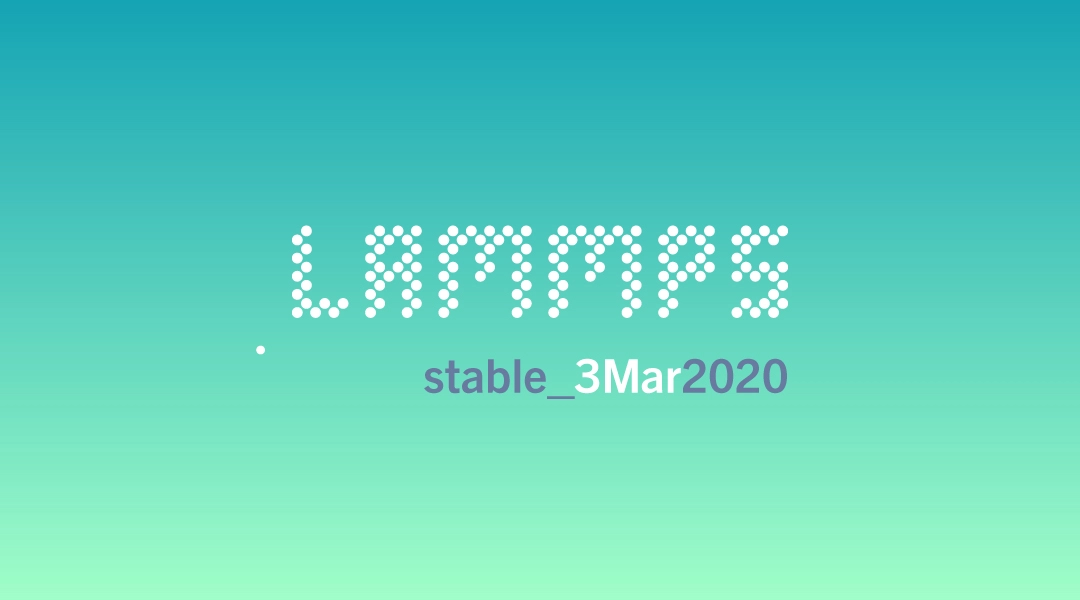
LAMMPS Stable Release Overview
Sandia just released a new stable release for LAMMPS, its popular molecular dynamics simulation program.
IMPORTANT NOTE:
This is the last LAMMPS release that does NOT require a C++11 compiler for the core code and CMake version 3.10 or newer. The next patches and stable releases will require a C++11 compatible C++ compiler to compile all of LAMMPS, not just for some of the optional packages. For some older compilers (e.g. GCC 4.8.x on CentOS 7.x) a flag to enable C++11 support may be required (e.g. -std=c++11 or -std=gnu++11 in the case of GCC 4.8.x).
Below is a list of major changes in LAMMPS since the last stable release 7 August 2019.
General changes
- The documentation file format has been changed from the custom txt2html markup to using reStructuredText (rst). This provides several advantages to have a better looking and more functional documentation. As a first step, all externally rendered equations have been converted to embedded math and all raw HTML markup converted. Most boxes with examples will use syntax highlighting. Further improvements in typesetting and layout are forthcoming. Additional consistency checks are now applied when processing the documentation.
- Many file read operations are now monitored for reading errors and thus allowing to detect damaged or incomplete files like potential parameter files and restart files
- Updates and improvements to the CMake build system to more closely match all the functionality provided by the conventional make based build system
- Support for threaded FFTs from FFTW and MKL, support for cuFFT and KISSFFT on the GPU with KOKKOS
- Expose neighbor lists to the library interface and the Python wrapper
- Documentation of installing LAMMPS via
conda - Many small improvements or bugfixes
Updates and new commands or styles
- new
dump_modifyoptions to embedITEM: UNITSandITEM: TIMEwith information about units and accumulated simulation time - new pair styles
cosine/squared,local/density,mesocnt - new fix styles
wall/reflect/stochastic,propel/self, 'npt/cauchy` - new compute
gyration/shape/chunk - new compute
hmafor fast, high-precision computation of certain thermodynamic properties of solids - new compute style
centroid/stress/atomfor computing per-atom stress in a way allowing for more accurate heat flux computations with interactions involving more than two atoms - new
third_ordercommand, a companion command todynamical_matrix, for computing the third-order force tensor from finite differences - new options
ratioandsubsetforcreate_atomsand similarly new optionstype/ratioandtype/subsetto thesetcommand - new tool for post-processing parallel tempering trajectories
- multiple updates, bugfixes, and improvements to
fix bond/react - improved implementation of minimization style
fire - support to run NWChem along with LAMMPS in client/server mode
Updates for packages
- KOKKOS now supports minimization (limited to minimization styles
cgandquadratic), updates to the KOKKOS library, general improvements and bugfixes, more styles ported to KOKKOS - several new SNAP potentials
- tweaks to USER-INTEL to compile correctly with too aggressively optimizing compilers, corrections, and improvements
- bugfixes and improvements for the GRANULAR package
- several new SNAP potentials and a new compute
snapfor training SNAP potentials - bugfixes and improvements to the KIM package, a new command
kim_paramfor accessing KIM model parameters - updates to the USER-COLVARS package with updates to the included Lepton library
- updates to the USER-PLUMED package with bugfixes and support for recent releases
- updates to the USER-CGDNA package including a new coarse-grained RNA model (oxRNA2)
- improvements and updates to the SPIN package, L-BFGS minimizer added
- updates, extensions, and improvements to the USER-MEAMC package
- memory leaks fixed when using styles from the GPU with multiple run commands, new pair style
lj/cut/tip4p/long/gpu - updates to
fix rigidvariants to add gravity to rigid objects with overlapping (granular) particles - support for
rerunandread_dumpwith USER-ADIOS
Backward compatibility notices
- building the USER-COLVARS package with all features enabled now requires a C++-11 compatible compiler
- due to changes in the random number generator initialization, results when using
fix pour,fix deposit,fix evaporateorcreate_atoms randomwill not match with previous versions of LAMMPS. see PR #1569 - the
gjfkeyword forfix langevinno longer supports the optionyes. Instead, you have to use eithervhalforvfull - the FIRE minimizer has been replaced with an improved implementation. The previous implementation is available as
fire/old. - new documentation has to be written in reStructuredText format
This release has 2 assets:
- Source code (zip)
- Source code (tar.gz)
Visit the release page to download them.
About LAMMPS
LAMMPS (Large-scale Atomic/Molecular Massively Parallel Simulator) is an open-source molecular dynamics simulator written in C++ from Sandia National Laboratories and is designed for parallel machines. LAMMPS models an ensemble of particles in a liquid, solid or gaseous state. It can model atomic polymeric, biological, metallic, or mesoscale systems using a variety of force fields and boundary conditions and is easily extensible.
Exxact offers turnkey certified LAMMPS GPU workstations and servers that are pre-configured and optimized to give the best performance right out of the box.

LAMMPS Stable Release 3 March 2020
LAMMPS Stable Release Overview
Sandia just released a new stable release for LAMMPS, its popular molecular dynamics simulation program.
IMPORTANT NOTE:
This is the last LAMMPS release that does NOT require a C++11 compiler for the core code and CMake version 3.10 or newer. The next patches and stable releases will require a C++11 compatible C++ compiler to compile all of LAMMPS, not just for some of the optional packages. For some older compilers (e.g. GCC 4.8.x on CentOS 7.x) a flag to enable C++11 support may be required (e.g. -std=c++11 or -std=gnu++11 in the case of GCC 4.8.x).
Below is a list of major changes in LAMMPS since the last stable release 7 August 2019.
General changes
- The documentation file format has been changed from the custom txt2html markup to using reStructuredText (rst). This provides several advantages to have a better looking and more functional documentation. As a first step, all externally rendered equations have been converted to embedded math and all raw HTML markup converted. Most boxes with examples will use syntax highlighting. Further improvements in typesetting and layout are forthcoming. Additional consistency checks are now applied when processing the documentation.
- Many file read operations are now monitored for reading errors and thus allowing to detect damaged or incomplete files like potential parameter files and restart files
- Updates and improvements to the CMake build system to more closely match all the functionality provided by the conventional make based build system
- Support for threaded FFTs from FFTW and MKL, support for cuFFT and KISSFFT on the GPU with KOKKOS
- Expose neighbor lists to the library interface and the Python wrapper
- Documentation of installing LAMMPS via
conda - Many small improvements or bugfixes
Updates and new commands or styles
- new
dump_modifyoptions to embedITEM: UNITSandITEM: TIMEwith information about units and accumulated simulation time - new pair styles
cosine/squared,local/density,mesocnt - new fix styles
wall/reflect/stochastic,propel/self, 'npt/cauchy` - new compute
gyration/shape/chunk - new compute
hmafor fast, high-precision computation of certain thermodynamic properties of solids - new compute style
centroid/stress/atomfor computing per-atom stress in a way allowing for more accurate heat flux computations with interactions involving more than two atoms - new
third_ordercommand, a companion command todynamical_matrix, for computing the third-order force tensor from finite differences - new options
ratioandsubsetforcreate_atomsand similarly new optionstype/ratioandtype/subsetto thesetcommand - new tool for post-processing parallel tempering trajectories
- multiple updates, bugfixes, and improvements to
fix bond/react - improved implementation of minimization style
fire - support to run NWChem along with LAMMPS in client/server mode
Updates for packages
- KOKKOS now supports minimization (limited to minimization styles
cgandquadratic), updates to the KOKKOS library, general improvements and bugfixes, more styles ported to KOKKOS - several new SNAP potentials
- tweaks to USER-INTEL to compile correctly with too aggressively optimizing compilers, corrections, and improvements
- bugfixes and improvements for the GRANULAR package
- several new SNAP potentials and a new compute
snapfor training SNAP potentials - bugfixes and improvements to the KIM package, a new command
kim_paramfor accessing KIM model parameters - updates to the USER-COLVARS package with updates to the included Lepton library
- updates to the USER-PLUMED package with bugfixes and support for recent releases
- updates to the USER-CGDNA package including a new coarse-grained RNA model (oxRNA2)
- improvements and updates to the SPIN package, L-BFGS minimizer added
- updates, extensions, and improvements to the USER-MEAMC package
- memory leaks fixed when using styles from the GPU with multiple run commands, new pair style
lj/cut/tip4p/long/gpu - updates to
fix rigidvariants to add gravity to rigid objects with overlapping (granular) particles - support for
rerunandread_dumpwith USER-ADIOS
Backward compatibility notices
- building the USER-COLVARS package with all features enabled now requires a C++-11 compatible compiler
- due to changes in the random number generator initialization, results when using
fix pour,fix deposit,fix evaporateorcreate_atoms randomwill not match with previous versions of LAMMPS. see PR #1569 - the
gjfkeyword forfix langevinno longer supports the optionyes. Instead, you have to use eithervhalforvfull - the FIRE minimizer has been replaced with an improved implementation. The previous implementation is available as
fire/old. - new documentation has to be written in reStructuredText format
This release has 2 assets:
- Source code (zip)
- Source code (tar.gz)
Visit the release page to download them.
About LAMMPS
LAMMPS (Large-scale Atomic/Molecular Massively Parallel Simulator) is an open-source molecular dynamics simulator written in C++ from Sandia National Laboratories and is designed for parallel machines. LAMMPS models an ensemble of particles in a liquid, solid or gaseous state. It can model atomic polymeric, biological, metallic, or mesoscale systems using a variety of force fields and boundary conditions and is easily extensible.
Exxact offers turnkey certified LAMMPS GPU workstations and servers that are pre-configured and optimized to give the best performance right out of the box.





.jpg?format=webp)